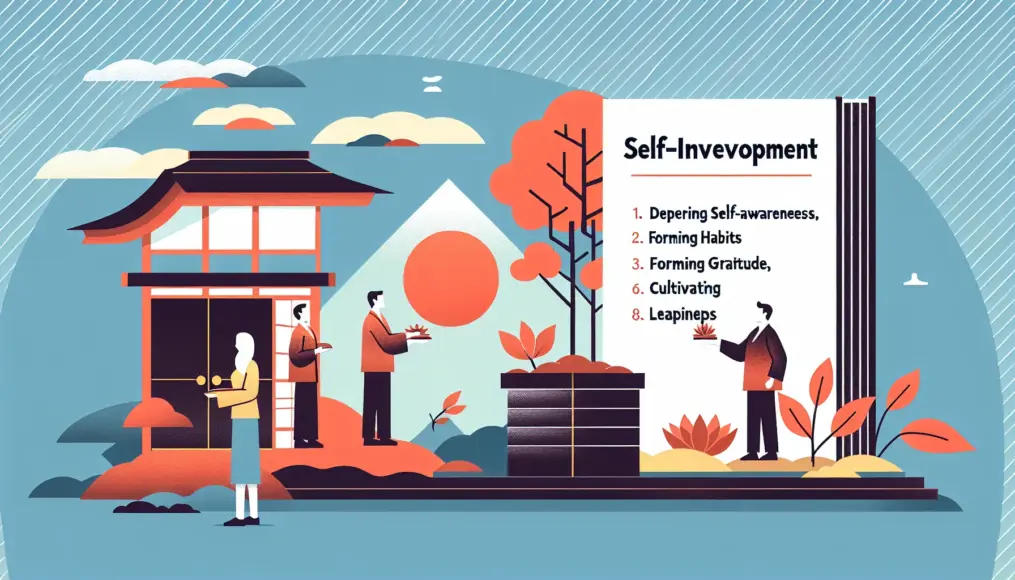Controlling your emotions is crucial for reducing stress and anxiety while maintaining a sense of calm. By learning how to navigate the various feelings that arise in daily life, you can deepen your self-understanding. In this article, we’ll explore practical approaches and techniques to help you manage your emotions effectively.
Like many people, you might be seeking ways to keep your mind serene, free from the turmoil that emotions can sometimes bring. Understanding how to achieve emotional balance can enhance your everyday life. Let’s discover some tips for attaining that inner peace.
- Understanding what emotions are and their role in our lives
- Insights on emotions from Stoic philosophy
- Mindfulness and breathing techniques you can practice in daily life
The Basics of Emotion Management
Controlling our emotions is crucial in our daily lives. Emotions significantly influence our behaviors and thoughts, so understanding and managing them can help alleviate stress and anxiety, leading to better relationships. In this chapter, we’ll first explore what emotions are, followed by an examination of their roles and impacts.
By gaining insight into our emotions, we can deepen our understanding of our internal experiences. Emotions are not merely reactions; they are shaped by our values and experiences. This foundational understanding is the first step toward mastering emotion control.
What Are Emotions?
Emotions encompass the psychological states we experience, such as joy, sadness, anger, and fear. These feelings determine how we respond to our surroundings. Emotions can also influence our physical reactions and behaviors, sometimes even swaying our judgments and choices.
Understanding our emotions allows us to better grasp our inner selves. There are both positive and negative emotions, and each plays an essential role in our mental well-being.
- Emotions are psychological states with various types.
- Emotions influence actions and judgments.
- Understanding emotions contributes to mental health.
The Role and Impact of Emotions
Emotions play a vital role in our lives. For instance, feelings of joy and gratitude can deepen our connections with others and strengthen social bonds. Conversely, emotions like anger and fear serve to alert us to danger and prompt self-protective actions.
Thus, emotions are a significant factor in shaping our behaviors and thoughts. By effectively managing our emotions, we can make better judgments and decisions. Additionally, understanding and accepting our emotions can lead to personal growth.
- Emotions strengthen social connections.
- Emotions prompt actions for self-defense.
- Controlling emotions can lead to better decision-making.
Understanding Emotions Through a Philosophical Lens
To truly grasp the nature of our emotions, it’s essential to adopt a philosophical perspective. Stoicism, in particular, offers valuable insights into how we perceive and manage our feelings. In this section, we’ll explore the core tenets of Stoic philosophy and contemplate ways to transcend our emotions. By drawing on philosophical wisdom, we can deepen our understanding of emotions and discover practical methods for controlling them.
According to Stoic philosophy, emotions significantly influence our thoughts and judgments, yet they are also something we can manage. By embracing this perspective, we can cultivate the ability to respond to our emotions with calmness rather than being swept away by them.
Stoicism and Emotions
Stoicism, a school of thought from ancient Greece, places a strong emphasis on the importance of controlling our emotions. Stoic philosophers believed that emotions are our responses to external events. In other words, emotions themselves are natural; what truly matters is how we choose to react to them.
The teachings of Stoicism advocate for understanding and accepting our emotions rather than suppressing them. This approach allows us to make more rational decisions without being dominated by our feelings. A key method for managing emotions is the application of reason.
- Stoicism emphasizes the control of emotions
- Emotions are responses to external events
- It is important to understand and accept emotions using reason
Ways to Transcend Emotions
To transcend our emotions, we first need to observe and understand them. A practical approach involves reflecting on the sources and reasons behind our emotions when they arise. This self-observation deepens our comprehension of our feelings.
Practicing meditation or mindfulness based on Stoic principles can also be beneficial. These practices help us cultivate the ability to view our emotions objectively, enabling us to respond to them with composure. Transcending emotions is not an overnight achievement; it requires consistent practice over time to gradually attain this skill.
If you found this article on emotional control intriguing, you might also enjoy our piece on “How to Master Your Emotions.” It provides practical techniques to help you understand your emotions and manage stress in daily life, so be sure to check it out!
- Observing and understanding your emotions is essential
- Meditation and mindfulness can be effective tools
- Cultivating the ability to transcend emotions through daily practice
Practical Techniques for Daily Life
To effectively manage your emotions, it’s essential to incorporate specific techniques you can practice in your everyday life. Mindfulness and breathing exercises are particularly well-known methods for emotional regulation. In this section, we’ll explore how to utilize these techniques and offer tips for integrating emotional control into your daily routine.
Taking the time to consciously center your thoughts is crucial for understanding and appropriately handling your emotions. By practicing mindfulness and breathing techniques, you can calm your mind and alleviate stress. Let’s dive into some practical methods.
Harnessing Mindfulness
Mindfulness is the practice of focusing your awareness on the present moment. This helps liberate you from regrets about the past and anxieties about the future, allowing you to maintain a sense of peace in your mind. Gradually incorporating mindfulness into your daily life can make it easier to manage your emotions.
Start by paying attention to your senses during activities like eating or walking. For instance, concentrate on the taste and aroma of your food, or the sounds around you and the feel of the breeze. By doing this, you can immerse yourself in the present moment, which helps you observe and manage your emotions more calmly.
- Mindfulness focuses your awareness on the present moment
- Easy to incorporate into daily life
- Develops the ability to observe emotions calmly
Calming Your Mind with Breathing Techniques
Breathing exercises offer a simple yet effective way to soothe your mind. Deep breathing promotes relaxation and can significantly reduce stress and anxiety. This technique is especially beneficial when you’re feeling tense or emotionally charged.
Specifically, try taking a few deep breaths, ensuring you feel your belly expand as you inhale and contract as you exhale. Continuing this breathing practice for a few minutes can help calm your mind and improve your emotional control. Regularly practicing this technique can be a great asset in managing stress.
If you’re interested in gaining more control over your emotions, check out this article: “A Guide to Mastering Your Emotions Using Psychology.” This guide provides a detailed look at psychological approaches to understanding and effectively managing your emotions.
- Breathing techniques are effective for calming the mind
- Deep breathing helps induce relaxation
- Useful for reducing tension and anxiety
Making Emotional Control a Habit
Learning to control your emotions isn’t just a one-time effort; it’s essential to integrate it into your daily routine. By making emotional control a habit, you can maintain a more stable mindset and enhance your resilience against stress and anxiety. In this section, we’ll explore the use of an emotional diary and the importance of ongoing self-reflection.
Keeping an emotional diary is a powerful tool for understanding your feelings. Through self-reflection, you can reassess your behaviors and thought patterns, allowing you to manage your emotions more effectively. Incorporating these habits into your life makes it easier to handle your emotions and supports your mental well-being.
The Benefits of an Emotional Diary
An emotional diary is a notebook where you record your feelings and their causes. By reflecting on your emotions daily or at regular intervals, you can identify the situations that trigger specific feelings. This understanding will help you recognize your emotional triggers and find appropriate coping strategies.
When writing in your diary, it’s crucial to detail the specific situations that elicited your emotions and how you reacted. This deeper understanding of your feelings will aid in managing them better in the future. By consistently keeping an emotional diary, you’ll be able to observe changes in your emotions and take necessary actions when needed.
- An emotional diary is a tool for understanding your feelings.
- It helps you identify your emotional triggers.
- You can observe changes in your emotions through journaling.
The Importance of Ongoing Self-Reflection
Regular self-reflection is vital for controlling your emotions. By engaging in self-reflection, you can review your behavioral and thought patterns, gaining insight into how you respond to your emotions. This process is a crucial step in strengthening your emotional control.
During self-reflection, it’s important to consider past events and your emotional responses, gathering feedback to encourage your personal growth. By calmly analyzing your reactions to emotions, you can prepare strategies for similar situations in the future. This will enable you to manage your emotions more effectively.
If you’re interested in making emotional control a habit, there’s more helpful information available. For those looking to dive deeper into practical methods and techniques for managing emotions, check out this article on “Practical Methods and Techniques for Controlling Emotions”. It includes specific techniques for alleviating stress and anxiety, so be sure to take a look.
- Regular self-reflection aids in emotional control.
- It’s important to review past behaviors and emotional responses.
- Analyzing your reactions allows you to prepare for future situations.
Summary
Learning how to manage our emotions is crucial for maintaining mental health. By understanding the fundamentals of emotional control and integrating practical techniques like Stoic philosophy, mindfulness, and breathing exercises into our daily routines, we can better navigate our feelings in everyday life. Additionally, utilizing an emotional journal and regularly reflecting on our experiences allows us to gain deeper insights into our emotions and foster personal growth.
There are various methods for controlling emotions, but their effectiveness comes from making them a habit. To achieve a sense of inner peace, consistent practice is essential. By observing fluctuations in our emotions and accepting them, we can lead richer, more fulfilling lives.
- Grasping the basics of emotional control is essential.
- Incorporate mindfulness and breathing techniques into daily life.
- Gain a deeper understanding of yourself through an emotional journal and self-reflection.
Let’s prioritize daily practices to support our mental health. We’d love to hear about your own methods and experiences with emotional control in the comments!













































Comment